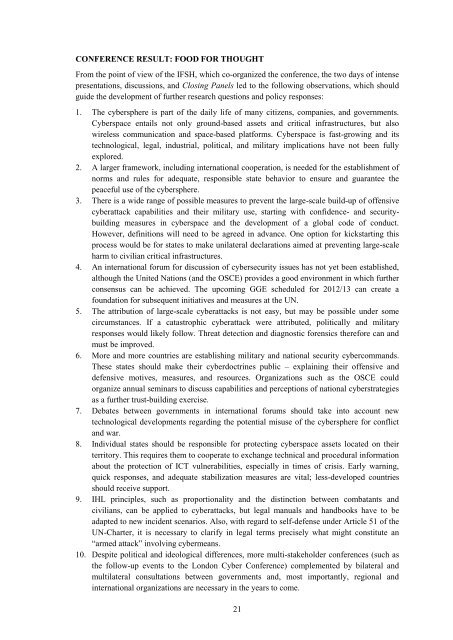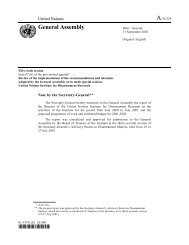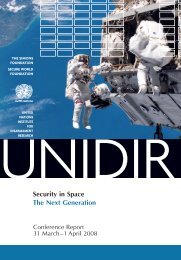Challenges in Cybersecurity Risks, Strategies, and ... - Unidir
Challenges in Cybersecurity Risks, Strategies, and ... - Unidir
Challenges in Cybersecurity Risks, Strategies, and ... - Unidir
Create successful ePaper yourself
Turn your PDF publications into a flip-book with our unique Google optimized e-Paper software.
CONFERENCE RESULT: FOOD FOR THOUGHT<br />
From the po<strong>in</strong>t of view of the IFSH, which co-organized the conference, the two days of <strong>in</strong>tense<br />
presentations, discussions, <strong>and</strong> Clos<strong>in</strong>g Panels led to the follow<strong>in</strong>g observations, which should<br />
guide the development of further research questions <strong>and</strong> policy responses:<br />
1. The cybersphere is part of the daily life of many citizens, companies, <strong>and</strong> governments.<br />
Cyberspace entails not only ground-based assets <strong>and</strong> critical <strong>in</strong>frastructures, but also<br />
wireless communication <strong>and</strong> space-based platforms. Cyberspace is fast-grow<strong>in</strong>g <strong>and</strong> its<br />
technological, legal, <strong>in</strong>dustrial, political, <strong>and</strong> military implications have not been fully<br />
explored.<br />
2. A larger framework, <strong>in</strong>clud<strong>in</strong>g <strong>in</strong>ternational cooperation, is needed for the establishment of<br />
norms <strong>and</strong> rules for adequate, responsible state behavior to ensure <strong>and</strong> guarantee the<br />
peaceful use of the cybersphere.<br />
3. There is a wide range of possible measures to prevent the large-scale build-up of offensive<br />
cyberattack capabilities <strong>and</strong> their military use, start<strong>in</strong>g with confidence- <strong>and</strong> securitybuild<strong>in</strong>g<br />
measures <strong>in</strong> cyberspace <strong>and</strong> the development of a global code of conduct.<br />
However, def<strong>in</strong>itions will need to be agreed <strong>in</strong> advance. One option for kickstart<strong>in</strong>g this<br />
process would be for states to make unilateral declarations aimed at prevent<strong>in</strong>g large-scale<br />
harm to civilian critical <strong>in</strong>frastructures.<br />
4. An <strong>in</strong>ternational forum for discussion of cybersecurity issues has not yet been established,<br />
although the United Nations (<strong>and</strong> the OSCE) provides a good environment <strong>in</strong> which further<br />
consensus can be achieved. The upcom<strong>in</strong>g GGE scheduled for 2012/13 can create a<br />
foundation for subsequent <strong>in</strong>itiatives <strong>and</strong> measures at the UN.<br />
5. The attribution of large-scale cyberattacks is not easy, but may be possible under some<br />
circumstances. If a catastrophic cyberattack were attributed, politically <strong>and</strong> military<br />
responses would likely follow. Threat detection <strong>and</strong> diagnostic forensics therefore can <strong>and</strong><br />
must be improved.<br />
6. More <strong>and</strong> more countries are establish<strong>in</strong>g military <strong>and</strong> national security cybercomm<strong>and</strong>s.<br />
These states should make their cyberdoctr<strong>in</strong>es public – expla<strong>in</strong><strong>in</strong>g their offensive <strong>and</strong><br />
defensive motives, measures, <strong>and</strong> resources. Organizations such as the OSCE could<br />
organize annual sem<strong>in</strong>ars to discuss capabilities <strong>and</strong> perceptions of national cyberstrategies<br />
as a further trust-build<strong>in</strong>g exercise.<br />
7. Debates between governments <strong>in</strong> <strong>in</strong>ternational forums should take <strong>in</strong>to account new<br />
technological developments regard<strong>in</strong>g the potential misuse of the cybersphere for conflict<br />
<strong>and</strong> war.<br />
8. Individual states should be responsible for protect<strong>in</strong>g cyberspace assets located on their<br />
territory. This requires them to cooperate to exchange technical <strong>and</strong> procedural <strong>in</strong>formation<br />
about the protection of ICT vulnerabilities, especially <strong>in</strong> times of crisis. Early warn<strong>in</strong>g,<br />
quick responses, <strong>and</strong> adequate stabilization measures are vital; less-developed countries<br />
should receive support.<br />
9. IHL pr<strong>in</strong>ciples, such as proportionality <strong>and</strong> the dist<strong>in</strong>ction between combatants <strong>and</strong><br />
civilians, can be applied to cyberattacks, but legal manuals <strong>and</strong> h<strong>and</strong>books have to be<br />
adapted to new <strong>in</strong>cident scenarios. Also, with regard to self-defense under Article 51 of the<br />
UN-Charter, it is necessary to clarify <strong>in</strong> legal terms precisely what might constitute an<br />
“armed attack” <strong>in</strong>volv<strong>in</strong>g cybermeans.<br />
10. Despite political <strong>and</strong> ideological differences, more multi-stakeholder conferences (such as<br />
the follow-up events to the London Cyber Conference) complemented by bilateral <strong>and</strong><br />
multilateral consultations between governments <strong>and</strong>, most importantly, regional <strong>and</strong><br />
<strong>in</strong>ternational organizations are necessary <strong>in</strong> the years to come.<br />
21








